President of Bulgaria
The President of the Republic of Bulgaria is the head of state of Bulgaria and the commander-in-chief of the Bulgarian Army. The official residence of the president is at Boyana Residence, Sofia. After the completion of the second round of voting, candidate Rumen Radev was elected President of Bulgaria on 13 November 2016.
| President of Bulgaria
Президент на България | |
|---|---|
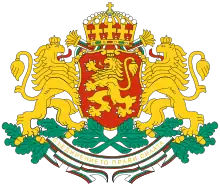 | |
| Style | His Excellency |
| Residence | Largo, Sofia (office), Boyana (residential) |
| Appointer | Popular vote |
| Term length | Five years, renewable once |
| Inaugural holder | Petar Mladenov as Chairman (President) of the Republic Zhelyu Zhelev |
| Formation | 3 April 1990 |
| Deputy | Vice President of Bulgaria |
| Salary | 11 044 leva per month[1] |
| Website | www |
 |
|---|
| This article is part of a series on the politics and government of Bulgaria |
|
|
In Bulgaria, the president's role is primarily as a symbolic figure, with the main function being to be the 'arbitrator' of disputes between Bulgaria's different institutions. They are not considered head of government or part of the nation's executive power. The president is elected for a five-year term, which is renewable only once. After an individual has served two terms as President, that individual will forever be barred from being elected to the presidency again under the rules set out by Bulgaria's Constitution.[2] The president addresses the nation on national television annually on New Year's Eve, just moments before the start of the new year.[3]
Election
Eligibility for election
For a Bulgarian citizen to be able to run for the office of President of Bulgaria, they must fulfil the following conditions:[2]
- Must be a Bulgarian citizen
- Must be at least 40 years old
- Must have lived in Bulgaria for the five years prior to the candidacy
- Must fulfil all conditions that would be required for election as a representative to Bulgaria's National Assembly
Electoral system
The president is elected directly by the Bulgarian people in a two-round majoritarian election. If a candidate manages to obtain more than 50% of the vote in the first round, that candidate is elected. If no candidate manages to obtain more than 50% of the vote in the first round, then the two top-performing candidates face off in a second round with first-past-the-post voting, with the candidate receiving the larger number of votes considered elected.[lower-alpha 1][2]
Restrictions
The president is banned from also being a member of the National Assembly, as well taking on any other government, public or private offices for the duration of his term. The president is also constitutionally forbidden from being involved in a leadership position of a political party while in office.[2] In practice, despite the fact that most candidates for President are elected from a political party's list[4] and despite the fact that the Constitution doesn't forbid the president from being an ordinary member of a political party, it is widely expected in Bulgarian society that the president-elect renounce all affiliations with political parties once elected and serve as an independent politician.[5][6][7]
Powers and privileges
The president of Bulgaria has a number of functions and powers that are regulated in Chapter 4 of the 1991 Constitution of Bulgaria. The president is elected directly by a popular vote for a period of five years which is renewable.
Presidential powers
The following powers belong to the president of Bulgaria:[2]
- The ability to give, restore or revoke[lower-alpha 2] Bulgarian citizenship, as well as refugee status.
- Appoint and dismiss senior government officials
- Exercise the right to pardon convicted criminals, as well as forgive 'uncollectible' debts owed to the government
- Rename villages, towns and cities, as well as objects of national importance
- Act as Supreme commander-in-chief of the Bulgarian Armed Forces
- Represent Bulgaria at home and abroad
- Schedule the National and local elections within the intervals designated by law
- Veto any bill coming from the National Assembly by refusing to sign it after its passage in the assembly.[lower-alpha 3]
- Declares war, martial law or any other state of emergency (This is done with the assistance of the Consultative Council on National Security)
- Grant and award the orders, decorations, and medals of Bulgaria
Immunity
The president enjoys blanket legal immunity during his tenure and is not held responsible for any act performed while on duty, with the exception of treason or violation of the Bulgarian constitution. His authority may only be stripped via impeachment and may not be removed by any other institution. The president cannot be detained and may not be prosecuted.[2]
Vice President
The president is assisted in these duties by the vice president of Bulgaria. The vice president replaces the president in case of absence. Only upon early termination of office of the vice president will assume the duties of president until elections are held. The Constitution permits the president to delegate to the vice president the powers to appoint and dismiss certain officials, issue pardons and amnesty, provide citizenship and refugee status, but does not allow the president to delegate any of his other powers., enjoys the same privileges of immunity as the president and can only be dismissed from his office under the same procedures as those regarding the president.[2]
Termination of office
According to the constitution, the mandate of the president is completed if and when:[2]
- The presidential term expires
- The president resigns before the Constitutional Court
- The president is permanently unable to perform his/her duties due to serious illness
- The president dies while in office
- The president is impeached
Impeachment
Impeachment can only begin if the president has committed treason or has violated the Constitution of Bulgaria. Impeachment starts after at least a quarter of the members of the National Assembly deposit an accusatory act before the assembly. The act must then be approved by a supermajority of 2/3 of all elected representatives in order to be accepted. If accepted, the case is referred to the Constitutional Court of Bulgaria, which must decide within a one-month time span whether or not the president is guilty of the crime he has been accused of by the Assembly. If the constitutional court finds that the president has committed treason or violated the constitution, as per the accusatory act, then the president is considered successfully impeached and is stripped of his authority.[2]
Bulgarian presidential line of succession
- 1. Vice President of Bulgaria
- 2. Chairman of the National Assembly
- 3. Prime Minister of Bulgaria
Latest election
| Candidate | Running mate | Party | First round | Second round | |||
|---|---|---|---|---|---|---|---|
| Votes | % | Votes | % | ||||
| Rumen Radev | Iliana Iotova | Independent (Bulgarian Socialist Party) | 973,754 | 25.44 | 2,063,032 | 59.37 | |
| Tsetska Tsacheva | Plamen Manushev | GERB | 840,635 | 21.96 | 1,256,485 | 36.16 | |
| Krasimir Karakachanov | Yavor Notev | United Patriots | 573,016 | 14.97 | |||
| Veselin Mareshki | Petar Petrov | Independent | 427,660 | 11.17 | |||
| Plamen Oresharski | Danail Papazov | Independent | 253,726 | 6.63 | |||
| Traycho Traykov | Sabi Sabev | Reformist Bloc | 224,734 | 5.87 | |||
| Ivailo Kalfin | Lyubomir Halachev | Alternative for Bulgarian Revival | 125,531 | 3.28 | |||
| Tatyana Doncheva | Mincho Spasov | Movement 21–NDSV | 69,372 | 1.81 | |||
| George Ganchev | Kolyo Paramov | Christian Social Union | 27,928 | 0.73 | |||
| Velizar Enchev | Bilyana Grancharova | Movement for Radical Change Bulgarian Spring | 18,213 | 0.48 | |||
| Dimitar Marinov | Radoslav Petrov | Bulgarian National Unification | 14,974 | 0.39 | |||
| Rumen Galabinov | Veska Voleva | Independent | 10,286 | 0.27 | |||
| Plamen Paskov | Svetozar Saev | Independent | 10,103 | 0.26 | |||
| Aleksandar Tomov | Radoslav Radoslavov | Bulgarian Socialdemocratic-Euroleft | 9,513 | 0.25 | |||
| Gospodin Tonev | Andrey Andreev | Bulgarian Democratic Community | 6,855 | 0.18 | |||
| Kemil Ramadan | Momchil Dobrev | Balkanic Democratic League | 6,089 | 0.16 | |||
| Kamen Popov | Georgi Nedelchev | Independent | 5,212 | 0.14 | |||
| Diana Dimitrova | Gabriel Gerasimov | Independent | 4,362 | 0.11 | |||
| Nikolay Banev | Sali Ibrayim | Independent | 4,196 | 0.11 | |||
| Yordanka Koleva | Veselin Hristov | Independent | 4,182 | 0.11 | |||
| Biser Milanov | Krasimir Nastev | Independent | 3,215 | 0.08 | |||
| None of the above | 214,094 | 5.59 | 155,411 | 4.47 | |||
| Total | 3,827,650 | 100.00 | 3,474,928 | 100.00 | |||
| Valid votes | 3,827,650 | 96.96 | 3,474,928 | 98.14 | |||
| Invalid/blank votes | 119,925 | 3.04 | 66,036 | 1.86 | |||
| Total votes | 3,947,575 | 100.00 | 3,540,964 | 100.00 | |||
| Registered voters/turnout | 7,014,723 | 56.28 | 7,020,119 | 50.44 | |||
| Source: Electoral Commission of Bulgaria | |||||||
Living former presidents
There are three living former Bulgarian presidents:
_(cropped).jpg.webp) Petar Stoyanov (age 68)
Petar Stoyanov (age 68)
since 2002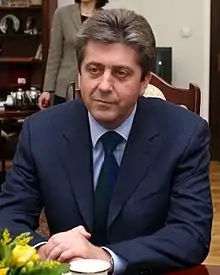 Georgi Parvanov (age 63)
Georgi Parvanov (age 63)
since 2012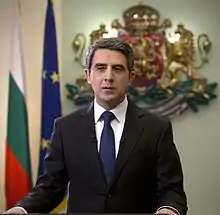 Rosen Plevneliev (age 56)
Rosen Plevneliev (age 56)
since 2017
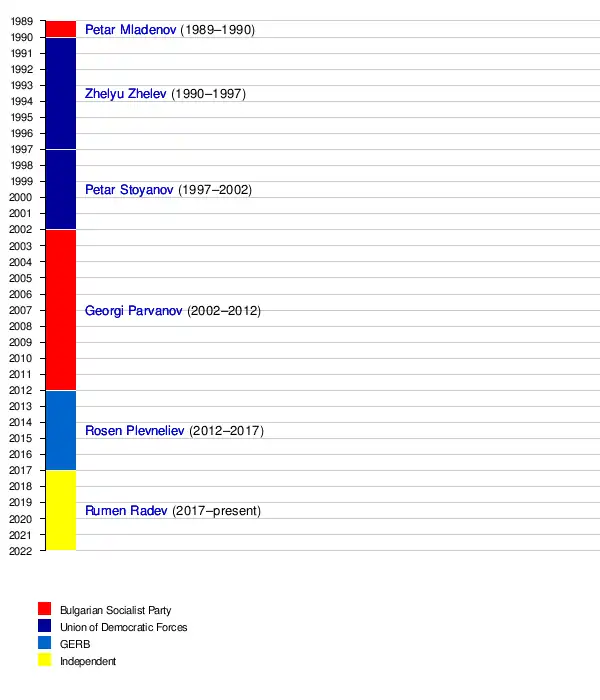
See also
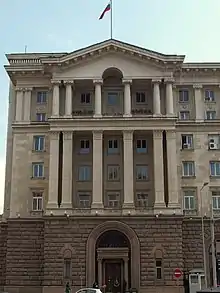
- Government of Bulgaria
- History of Bulgaria
- Politics of Bulgaria
- List of heads of state of Bulgaria
- List of Presidents of Bulgaria (1990-present)
- List of Bulgarian monarchs
- Prime Minister of Bulgaria
Notes
- Bulgarian election law permits voters to vote against all candidates. In reality, this has no effect, as those votes aren't counted during the tally and as such would not affect the outcome of the election.
- Revocation of citizenship can only be done to citizens who acquired their citizenship through the process of naturalization and not to native-born Bulgarians. It can only be applied after the citizen in question has been convicted of a serious crime and even then cannot be performed if the revocation would cause the person to enter into statelessness (i.e. has no other citizenship).
- In practice this power is very weak, as after a veto the bill is sent back to the assembly for another vote, in which the veto can be overruled by a simple majority. If the veto is overruled, the President is constitutionally obliged to sign the bill into law.
References
- "Bulgaria hikes pay for MPs, Prime Minister and President". 14 February 2018.
- "Constitution of the Republic of Bulgaria". www.parliament.bg. Chapter 4. Retrieved 2019-10-21.
- "Трите символа на телевизионната Нова година - приветствие, часовник и Дунавско". www.24chasa.bg. Retrieved 2019-10-21.
- Тотева, публикувана от Паолина (2016-08-26). "Коларова: Никой президент не е напълно независим". Flashnews (in Bulgarian). Retrieved 2019-10-21.
- "Надпартиен президент? То е като коледното намаление". www.24chasa.bg. Retrieved 2019-10-21.
- "България има нужда от надпартиен президент, смята Меглена Кунева". www.dnevnik.bg (in Bulgarian). Retrieved 2019-10-21.
- "Президентът трябва да е надпартиен". Fakti.bg - Да извадим фактите наяве. Retrieved 2019-10-21.
External links
![]() Media related to Category:Presidents of Bulgaria at Wikimedia Commons
Media related to Category:Presidents of Bulgaria at Wikimedia Commons
.jpg.webp)
.svg.png.webp)